Features
An Absurd play in Parliament: Qualifications versus education

By Kaushalya Perera
 Sri Lankans love their educational qualifications. Qualifications permit envious comparisons of value, similar to the ownership of gold jewellery, an expensive watch or a branded pair of shoes, resulting in exactly the same questions of provenance, worth and authenticity, but from a much higher moral ground.
Sri Lankans love their educational qualifications. Qualifications permit envious comparisons of value, similar to the ownership of gold jewellery, an expensive watch or a branded pair of shoes, resulting in exactly the same questions of provenance, worth and authenticity, but from a much higher moral ground.
For the past two weeks we, the people, have watched as allegations that the (now) ex-Speaker’s educational qualifications were faked, proliferated across the news and social media. We waited for him to prove otherwise, all the while observing how his party and his current place of work (the Parliament) seemed to have neither the will nor the means to verify these claims. As I write, the ‘qualifications war’ has turned into an Absurd play.
Why were the ex-Speaker’s qualifications so important?
This is a two-fold problem related to the unhealthy relationship that Sri Lankans have with qualifications, coupled with NPP’s self-branding as a ‘clean’ party.
Let’s take the second part first. One of the NPP’s pledges was that they would give ‘sudussata sudusu thaena’, i.e., appropriate positions to suitable individuals. This was a constant thread of their election rhetoric and it was accepted as a counter to the rampant nepotism and cronyism we have been seeing. After the (ex) Speaker stepped down, the Prime Minister said in Parliament that her Party includes members with no certificates, as well as those with many qualifications; that all are equally valued because her party values all types of knowledge; and that knowledge cannot be understood narrowly.
I fully agree. It is the kind of vision I expect from a Minister of Education. At the same time, it cannot be denied that the NPP knowingly played the qualifications game during their long drawn-out campaign. The JVP’s image—associated in public discourse with ragging, student protests and workers’ strikes—was subsumed into the NPP’s much-vaunted membership of professionals, academics and artists.
And the reason why the ‘qualifications game’ was so effective as election currency is precisely because Sri Lankans value qualifications so highly, in such a problematic way. It provided legitimacy to the NPP’s portrayal of themselves as a party standing against a host of corrupt charlatans.
This brings us to the first part of the problem – our love of qualifications. In the education sectors, we’re all familiar with that little line: ‘A certificate will be provided’, which is included to increase participant numbers. Also familiar are instances of people registering for a specific course disappearing from the actual class and turning up at the ‘certificate-awarding ceremony’. Further, degrees are often demanded in some sectors for jobs that do not require one.
This love of qualifications is not a new phenomenon. In an interesting article, titled ‘The growth of foreign qualification suppliers in Sri Lanka’, published in 2005, Angela W. Little and Jane Evans describe the growth of the ‘qualification marketplace’ in Sri Lanka. They found that advertisements by ‘qualification-suppliers’ in three national newspapers (Sinhala, Tamil and English) grew steeply over three decades, rising from 15 qualification-suppliers in 1965 to 153 in 2000. One can only imagine what a post-2000 study would reveal!
The authors chart the rise of the qualifications industry in parallel with the economic liberalisation and economic growth that occurred post-1980. Though they did not make this link, we can connect this rise to the failure to expand higher and vocational education to a growing population and a fast-changing economy, during two decades of political upheaval. During this period, public funds for education declined, and declined even more sharply post-2000, despite large loans from international financial organisations. This is the context for both the deterioration of public education and the rise of privately-funded education, which is symbolised by the desire for a qualification, rather than an education.
Qualification versus education
Re-creating a society that values learning and education over a certificate of qualification would involve a protracted and difficult journey. It would require a few decades of high quality, widely-accessible education as well as moral re-socialisation: a simple-sounding solution, yet one that is very difficult to initiate and achieve. Indeed, it would be illogical to expect any kind of moral or ethical socialisation from an underfunded and damaged education system, embedded in a decaying society.
The fact remains that the education sector desperately needs actual physical resources. Today, while a small proportion of schools in Sri Lanka contemplate installing computer labs, other schools are deprived of the basics; school meals, electricity, running water, uniforms, chairs, desks and books. We also need more and better paid teachers, plus national regulations and explicit minimum standards for the teaching profession, regardless of whether they are in the state, private or international sectors.
A larger issue that is not discussed is that we actually do not know enough about our own education system. Our attention has for too long been focused on the state education system, resulting in a lack of attention towards other sectors, e.g., early education, private and international education. The education ecosystem in the country needs urgent study, and researchers across disciplines can contribute to this need. And while the education sector has accepted multiple donations and loans, it is not at all clear if these funds are used in a manner that best fits the purpose.
In summary, it is vitally important that the fundamentals must be fixed. But we need to also re-think the way we over-estimate the value of a qualification, as against a wholesome education.
A re-examination of values and ethics
The fact that we value qualifications rather than an education has been apparent for a long time now. The prevalence of forged certificates and honorary doctorates is not the only indicator. Long before ChatGPT arrived, newspapers and social media were advertising ghostwriting services, i.e., the writing of assignments and dissertations for a fee. This is a business that is clearly unethical and must surely be illegal, but it is now so common that both the suppliers and their clients appear to consider it perfectly normal.
We have come to value quantity over quality: two degrees simultaneously, more qualifications, promotions and rankings based on numerical criteria and so on.
Start somewhere
It is obvious that ethics socialisation has not happened through education in Sri Lanka. This is a major problem that has no simple or quick solution. When the Parliament that is supposed to be discussing the interim budget of a financially distressed country spends that time trading accusations with each other about each other’s educational qualifications; when an MP is unable to prove – even after a week – the qualifications he claims to possess and then imagines that it is sufficient to resign from his position but not from his seat in Parliament; when a party that has pledged immediate action on corruption-related issues takes several days to effect a resignation from a powerful position; and when the Prime Minister and Cabinet Spokesperson are angered when questioned about matters of veracity and authenticity – we know we still have a long way to go to re-socialise a population into ethical beliefs and conduct. It is not enough to prevent bribes and reduce wasteful spending. We also need to start looking at providing meaningful and broad-based public education, where learning and integrity go hand in hand.
(Kaushalya Perera teaches at the Department of English, University of Colombo.)
Kuppi is a politics and pedagogy happening on the margins of the lecture hall that parodies, subverts, and simultaneously reaffirms social hierarchies.
Features
Minorities want govt. to solve their problems directly
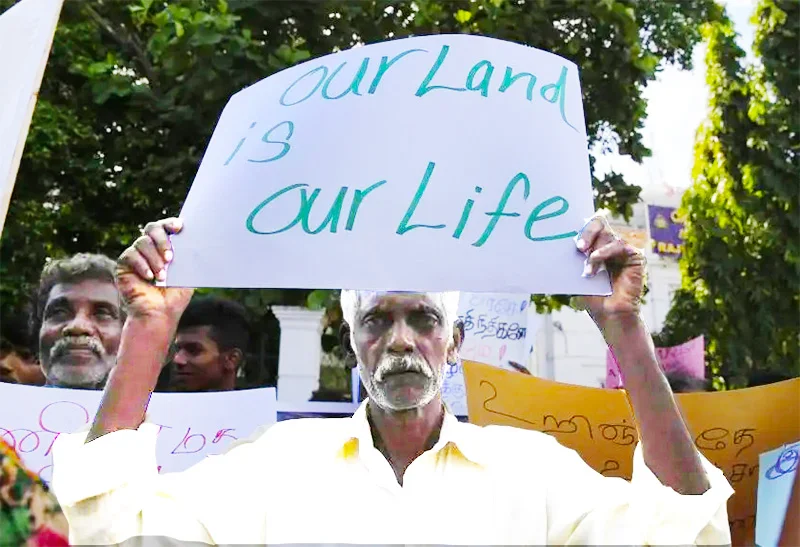
by Jehan Perera
The participation of Deputy Minister of National Integration, Muneer Mulaffar, in a conference on “Building a peaceful pluralistic Sri Lanka through Social Cohesion and Coexistence” organized by the Association of War Affected Women (AWAW), together with other peacebuilding organisations, was the highlight of the event. The Minister spoke eloquently on the government’s commitment to national integration. The event was attended by more than 150 participants, drawn from clergy of all religions, civil society, the academic community and several embassies. The Minister’s participation and speech on the occasion gave two important signals to the participants and the country at large. One message was that the government considered the national reconciliation process to be one that merited its time and effort. The other message was that the task of civil society and citizens was important for the wellbeing of the country.
The constructive role of civil society, which was evident at the conference on “Building a peaceful pluralistic Sri Lanka through Social Cohesion and Coexistence” is that civil society can prepare the ground for the government to engage in problem solving. NGOs are able to go to the grassroots and explain to the people the decisions that the government makes in the national interest. The conference, in which Minister Mulaffar participated, was an example as it sought to build on an initiative taken by senior Buddhist monks to break the deadlock with the Tamil Diaspora on the issue of national reconciliation. In April 2023, the two sides met in Nepal where they formulated a set of principles, known today as the Himalaya Declaration, on which national reconciliation could be built.
The statement, prepared by the convenors of the Conference and which was handed over to Minister Mulaffar, summarized the sentiments of religious clergy, civil society and the academic community who had participated in consultations that spanned over a year, and across the country, since the Himalaya Declaration had got publicized. The statement, built on the Himalaya Declaration, comprised five sections, namely, political reforms (with a focus on constitutional reforms), transitional justice (dealing with the past), equal protection and equal rights, Malaiyaha Tamils (with a focus on the historical injustices they had been subjected to which continue to this day) and good governance (rule of law and strengthening state institutions) for a better and more just Sri Lanka.
FURTHER CONSULTATIONS
As a follow up, the convening organisations also intend to have consultations with political parties with a view to building cross party (bipartisan) support to implement the reforms that are agreed to. The long history of failures of successive governments to resolve the ethnic conflict has been due to the negative role that opposition parties have always played to scuttle governmental initiatives to settle the problem. Therefore, the opposition parties need to be brought on board by the government this time and civil society is ready to assist in this task.
At the recently concluded general elections, the government obtained support from the ethnic and religious minorities, comprising Tamils and Muslims in particular. This enabled it to win all over the country, including seven out of the eight districts in the North and East in which the ethnic and religious minorities predominate. At the consultations, the view was expressed that the electorate in the North and East had placed their trust in the government to resolve their problems. This was described by a Jaffna university academic as the people in the North and East wanting the government to solve the problems directly without going through “middlemen”.
However, it is important that Tamils and Muslims should be included in government bodies set up to enact the system change for which the government was elected. President Anura Kumara Dissanayake has recently appointed a Presidential Task Force, with the heads of the armed forces and no Tamil or Muslim representation, with the goal “of elevating society to a more advanced status through a social, environmental and ethical awakening”. It consists of 18 members. But absent from the list of members are Muslims or Tamils. Given that Sri Lanka is a multiethnic and multireligious society, their inclusion, too, is necessary so that the task force will get a more rounded view of the problems at hand.
LOOKING FORWARD
The fact that the Tamil and Muslim people want the government to solve their problems without going through intermediaries is due to their loss of faith in the approaches of the traditional Tamil and Muslim political parties. Their problems still remain and they want them solved. The situation of the Malaiyaha Tamils is a relevant example. They were denied their citizenship rights at the dawn of Independence. The Malaiyaha Tamil people continue to suffer from that act of discrimination. They continue to live in line rooms and do not have a home on a piece of land to call their own. The policy decision taken by the previous government to grant them seven perches of land to build their own homes is yet to be operationalized.
The same holds true for the Tamil people of the North and East. Some of them lost their lands to the military many years ago and have yet to get them back. Some of them have lost their children and do not know where they are or what happened to them, even though some of them were handed over to the military by their parents. At a more basic level, the Tamil-speaking people continue to receive official communications from the government in the Sinhala language even though Tamil is also an official language in the Constitution. A more recent, and more volatile, issue is that of ancient religious sites where they feel threatened while others feel unfairly treated.
During the consultations, a view was expressed that the Tamil and Muslim people did not ask the government to do big things but to start with small things. Indeed, the government has given back some private land that was taken over by the military back to their owners. It opened up a road that was closed for over 30 years. It gave the Tamil people the right to memorialize (which was already provided for in law) without facing harassment by the police. President Anura Kumara Dissanayake has also affirmed that the government is laying the legal groundwork for the conduct of Provincial Council elections. There is a lot to look forward to. For Sri Lanka to achieve lasting reconciliation, the government needs to ensure that members of all communities are part of its mechanisms that engage in problem solving at all levels of governance.
Features
Spread some Love this Christmas, in 2025, and beyond…

 Several well-known personalities have joined our scene to wish The Island readers a Merry Christmas and a Happy New Year.
Several well-known personalities have joined our scene to wish The Island readers a Merry Christmas and a Happy New Year.
Yes, let’s all celebrate this joyous occasion with love in our hearts and let us spread that love in the New Year, too…and beyond.
* Noeline Honter:
Christmas is my favourite time of the year! I simply love the feel of Christmas in the air, the hustle and bustle of Christmas preparations, the delicious aroma of the cake baking in the oven, the glittering Christmas tree, yuletide carols and on and on and on. It’s about family and friends.
But, most of all, it’s The Reason for The Season…The Birth of Our Lord Jesus Christ and the Salvation, Peace, Joy, and Love that He brings. So spread some Love this Christmas, in 2025, and beyond!
My thanks to Ivan for providing me with the opportunity of sharing my wishes with you this Christmas. “And so I’m offering this simple phrase, wishing all my family, friends, fans, and all the kids from one to 92, a Very Merry Christmas, and Peace, Joy and Love in 2025.
* Suzi Fluckiger:
I know lots of folks will be eagerly awaiting Santa’s arrival. Well, if you have been good, Santa will surely say ‘hi’ to you. Merry Christmas to all readers of The Island newspaper; and in the New Year I would like to see everybody brush up their ways and learn to love people and accept them for who they are. We can’t change the world but we can “make it a better place for you and me,” like in ‘Heal The World.’
* Sohan Weerasinghe:

This year Christmas, and the New Year, is going to be amazing!
Record crowds are expected from abroad to celebrate the festive season. Many shows have been planned and most hotels are going out of their way to have fabulous New Year dances.
While enjoying with our friends, relations and fans, do spare a thought for those who are also in need.
Do your utmost to help those people who are in need and make their Christmas and New Year memorable, too. God bless our Sri Lanka.
* Maneka Liyanage:
Christmas is more than just a time for gifts and festivities—it’s about remembering the life of Christ and the teachings He left behind. His message of love, humility, and compassion is needed more than ever in a world plagued by conflict and suffering. This holiday season, may we seek to be instruments of peace, bringing light to those in darkness. Wishing you a blessed Christmas, and a New Year filled with love and hope for all.
* Lorensz Francke:
Greetings from Toronto, Canada. I was on a 16-day vacation in our beautiful island of Sri Lanka and did a couple of performances as well. It was truly memorable and I will be back one day soon. In the meanwhile, let me take this opportunity to wish everyone a festive and joyful holiday season…and a Happy New Year 2025.
* Melantha Perera:
Every year I compose a Christmas song and these are a few lines from my Christmas song for this year which will be sung by many friends residing in different parts in the world.
“In this festive season let your love be felt by the needy; it’s our duty to make them smile. That special reason for this season where we all can enjoy in style.”
A blessed Christmas and a Happy New Year to all.

* Kay Jay:
Christmas is been celebrated not only by Christians, but by other religious people as well. And Christ means peace, joy and hope, so it’s nice to see the whole world celebrating with joy as they all feel the peace and joy of the Lord Jesus in a spiritual way. I pray for peace and joy to all… this season, and a wonderful New Year to all.
Wish you all a Merry Christmas and a Happy New Year.
* Brian Kerkoven:
In a world full of rejection and hurt, we should be confident and love ourselves for who, and what, we are. Shine brightly for the FESTIVE Season and ALWAYS. Season’s Greetings to everyone.
* Andrea Marr:
Wishing you all a Blessed Christmas and a Bright and Prosperous New Year. The message of Christmas is Love, so let Love be your focus this Christmas.
Features
Irish rebellion inspired Jews
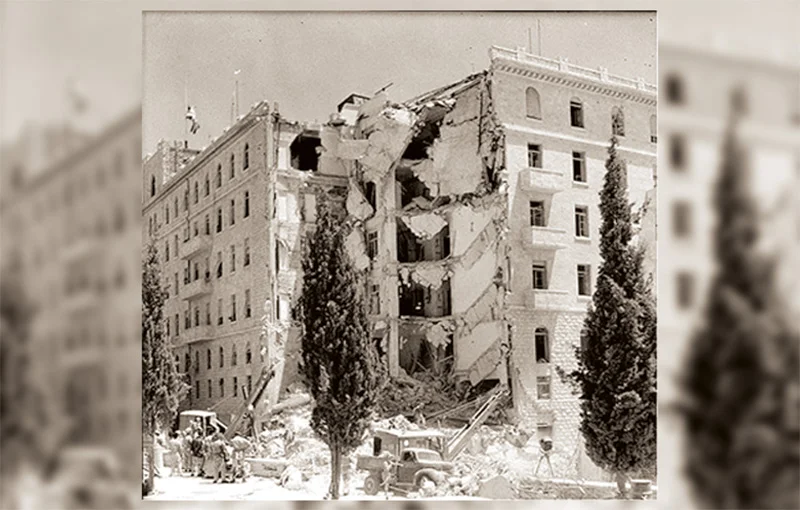
Palestine and Ireland: United by partition – II
by Jayantha Somasundaram
(First part of this article appeared
yesterday (23 Dec., 2024)
In the early years of the Twentieth Century the Irish and the Jews were unwittingly united by their military campaign against British rule in Ireland and Palestine. “Reasons for these allegiances are complex and rooted in shared experiences of imperialism” wrote M. C. Rast author of Shaping Ireland’s Independence: Nationalist, Unionist and British Solutions to the Irish Question 1909-1925 in History Today’s June 2024 edition.
Ireland is divided not only geographically between the north and south but also between Roman Catholicism and Protestant Christianity; while the Republican South is consciously pro-Palestine, Northern Ireland is pro-Israel. As the British tried to escape from the turmoil in both colonial Palestine and Ireland by resorting to partition, just as they would do in British India, the parallels become evident. The Government of Ireland Act (1920) and the Anglo-Irish Treaty (1921) only led to civil war and religious rioting; just what partition would do for Palestine and British India.
Palestine became part of the Ottoman Empire in 1516 and was fought over during World War I. The British captured Palestine from the Ottomans during the War and were mandated by the League of Nations (the precursor to the United Nations) to progress Palestine towards independence. Jewish settlers had initially welcomed the British Mandate because they believed that London would, in terms of the 1917 Balfour Declaration, create a Jewish homeland in Palestine.
Up to the first century AD Palestine had been Jewish-majority, then a Christian-majority society (second to the eleventh century) and thereafter Muslim-majority. “In 1919 there were approximately 58,000 Jews in Palestine, with ‘non-Jewish communities’ constituting 91.7 per cent of the population…by 1937 the Jewish population had risen to 386,084, comprising 27.9 per cent of the total,” explains Rast.
In the half century beginning 1880, the USA was the destination of choice for European Jews, with two and a half million migrating over that period. This tide however was stemmed when the US Congress passed the Immigration Act in 1924 limiting this flow. European Jewish immigration therefore was redirected to Palestine.
The 1937 Peel Commission would recommend partition; it used the Irish partition as its model saying that “the gulf between Arabs and Jews in Palestine is wider than that which separates Northern Ireland from the Irish Free State.” To which The Derry Journal retorted “Britain cares not a fig for the welfare of either Jew or Arab, any more than for Catholic or Protestant Irishman, except in so far as the one can be played off against the other for purposes of imperial policy.’
Irgun
As a consequence of Arab rioting in August 1929 which saw 67 Jews killed in Hebron, a tragedy that led many Jews to believe in the need for armed action, Irgun – Hā Irgun Ha-Tzvaʾī Ha-Leūmī b-Ērētz Yiśrāʾel – the National Military Organization in the Land of Israel – was formed in 1931. Until his death in 1940, its leader was Vladimir Yevgenyevich Zhabotinsky (later Ze’ev Jabotinsky) a Russian Jew. The number of members of Irgun varied from a few hundred to a few thousand. But Jabotinsky’s influence survived his early death, his ideas being carried forward by Menachem Begin (Israel’s Prime Minister 1977–1983) and the son of his secretary the Polish Jew, Benzion Mileikowsky: Israel’s current Prime Minister Benjamin Netanyahu.
Besides Irgun another important paramilitary group Lehi emerged in British Palestine. It was founded in 1940 by Avraham Stern. Stern was born in Poland in 1907 but moved to Palestine when he was 18 to study at the Hebrew University and would later join Irgun which was debating what stance should be adopted towards the British who were now fighting Nazi Germany. Stern argued that the Irish example during World War I provided the model for the Jews; to exploit Britain’s preoccupation with a war in Europe to mount pressure on them. He and his followers broke with Irgun in August 1940 and formed the Lohamei herut yisrael (The Fighters for Israel’s Freedom) or Lehi.
Stern’s ideas were taken from Mikhail Bakunin the 19th century Russian anarchist. Bakunin stressed armed struggle and Stern viewed the two millennia of exile as lulling the Jewish people into complacency. According to Professor Shlomo Shpiro of Bar-Ilan University in Israel, a specialist in intelligence, terrorism and security, for Stern the task of nation building in Palestine and the struggle for statehood would enable Jewish exceptionalism to consummate itself. “Our nation has a culture and a level of development higher than those of other nations. We have higher moral values. Some call this ‘the Chosen People.’ We must be a unique group within a unique nation.”
Lehi
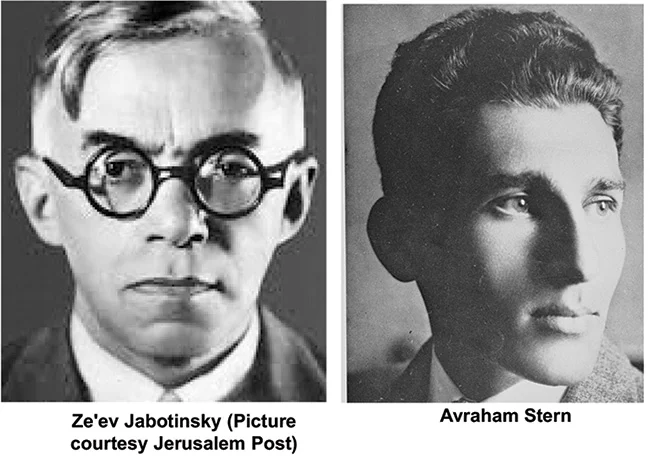
Stern believed that suffering and privation as a consequence of an armed struggle for nationhood and statehood would enable the Jews to rediscover themselves. The armed struggle must not however end with the achievement of statehood; it was a means not an end for the Jewish nation. Combat was therefore not merely the responsibility of the soldier. “Our nation will fight for a long time in its own land before it establishes its own sovereign rule…therefore, many more generations of Jewish children will go to school to learn the skills of the sword, and for many generations to come will the Hebrew Kingdom be as a military camp in the Oriental Arab desert.” Armed struggle was the duty of all; every Jew had to be a warrior. Religion more than political ends raised armed struggle to a ritual above any other facet of human endeavour. ‘‘Hallelujah with machine guns! The Lord is a Man of War! Hallelujah with battle and bomb! Hallelujah with rifle and grenade! Hallelujah to the Ruler of Zion!’’
Unlike many East European Jews who had socialist sympathies and admired the emancipation of the Jews that followed the Russian Revolution, Stern was influenced more by radical right-wing European conservative thinking and the practical gains of De Valera and the Sinn Fein in Ireland. In fact Yitzhak Shamir his lieutenant and successor adopted Michael as his nom de guerre in memory of Michael Collins, the Irish rebel.
Stern succeeded in creating a nationalist ideology with messianic Jewish elements. “Stern was the first modern Jewish thinker to propound violence and terrorism as a core ideology of national liberation and independence, rather than a temporary or expedient means of self-defence.” (SHPIRO, Shlomo The Intellectual Foundations of Jewish National Terrorism: Avraham Stern and the Lehi (Terrorism and Political Violence Vol. 25, No. 4, 2013 pp 606–620)
By early 1942 the British Police had effectively penetrated Lehi, had hunted down and killed or arrested its cadre and Stern had become a fugitive. He was finally tracked down and killed on 12 February 1942. Stern was succeeded by Yitzhak Yezernitsky (later Yitzhak Shamir) from Belarus, who would be a future Israeli prime minister (1983–84 and 1986–1992). Under Shamir, Lehi adopted Bakunin’s cell structure, became better organised, better equipped and drew new recruits enabling it to launch more effective attacks against the British in Palestine. He ordered the assassination in Cairo in November 1944 of the most senior British official in the region, the Minister Resident for the Middle East, 1st Baron Moyne, Lord Walter Edward Guinness DSO* PC.
During and after the Second World War there was a huge influx of illegal Jewish refugees arriving in Palestine in ever increasing numbers, though even as late as 1947, the Palestinians, both Muslim and Christian, still made up two thirds of the population.
King David Hotel
In July 1946 Begin directed the bombing of Jerusalem’s King David Hotel. The explosives were placed below its southern wing which “housed the nerve centre of British rule in Palestine: the government secretariat and the headquarters of both British military forces in Palestine and Transjordan and British intelligence.” (HOFFMAN, Bruce The rationality of terrorism and other forms of political violence: lessons from the Jewish campaign in Palestine 1937-1947 (Small Wars & Insurgencies Vol. 22, No. 2, May 2011, pp 258–272)
King David Hotel: After the attack
The blast killed 91 persons and injured 45 others, many of them civilians. The King David Hotel attack which is regarded as the single most lethal terrorist incident of the twentieth century secured Irgun’s political objective. It drew the world’s attention to Palestine, the struggle of the Jews and the military impotence of British colonial rule. It exposed the hollow claim of the British Mandate authorities that they were prevailing militarily against terrorism. Begin had successfully created panic among the British public and shaken their confidence in London’s ability to govern Palestine.
Back in the UK newspaper editorials swayed public opinion with this typical report in the Manchester Guardian that the bombings “will be a shock to those who imagined that the Government’s firmness had put a stop to Jewish terrorism and had brought about an easier situation in Palestine. In fact, the opposite is the truth.” (Hoffman 2011:264).
In Palestine the Mandate authority responded with harsh measures: daily curfews, cordon-and-search operations and even martial law. These extreme measures only alienated people from the British. Begin explained his strategy in these terms: “‘The very existence of an underground must, in the end, undermine the prestige of a colonial regime that lives by the legend of its omnipotence. Every attack which it fails to prevent is a blow at its standing. Even if the attack does not succeed, it makes a dent in that prestige, and that dent widens into a crack which is extended with every succeeding attack.’ Thus, even though the British forces outnumbered the terrorists by twenty to one – so that there was, according to one account, ‘one armed soldier to each adult male Jew in Palestine’ – despite this overwhelming numerical superiority, the British were still unable to destroy the Irgun and maintain order in Palestine.” (Hoffman 2011:265)
Invisible Armies
In July 1947, in response to the execution of three convicted Irgun terrorists the group publicly hung two captured British Army sergeants. According to the British Colonial Secretary Arthur Creech-Jones this outrage was the most significant factor that determined London’s withdrawal from Palestine. “For both the British public and the press, the murders seemed to demonstrate the futility of the situation in Palestine and the pointlessness of remaining there any longer than was absolutely necessary.” (Hoffman 2011:266)
Britain had deployed 100,000 troops in Palestine, saturated Jerusalem and turned it into a fortified camp controlled by barbed wire and curfews. Finally, unable to cope Britain handed the Palestine issue over to the United Nations. “In 1947 the British Cabinet decided to abandon Palestine after three years of attacks by Jewish terrorists, most belonging to the right-wing Irgun and Lehi (Stern Gang)…This was one of the most successful terrorist campaigns ever waged.” (BOOT, Max Invisible Armies (New York: Liveright Publishing 2013) p325)
Both in Palestine and globally, many Jews were critical of this terror campaign. In 1948, The New York Times published a letter signed by a number of prominent Jewish figures including Hannah Arendt, Albert Einstein, Sidney Hook, and Rabbi Jessurun Cardozo, which described Irgun as “a terrorist, right-wing, chauvinist organization in Palestine.”
Hoffman concludes that “it is indisputable that, at the very least, the successes won through violence by the Irgun clearly demonstrated that, notwithstanding the repeated denials of governments, terrorism can, in the right conditions and with the appropriate strategy and tactics, indeed ‘work’. Even if the Irgun’s success did not manifest itself in terms of the actual acquisition of power in government (Begin and his Herut Party remained in opposition for some 30 years)…their success in attracting attention to themselves and their cause, and most significantly both hastening and affecting government decision-making, cannot be disregarded… Thus the foundations were laid for the transformation of terrorism in the late 1960s from a primarily localized phenomenon into the security problem of global proportions that it is today. Indeed, when US military forces invaded Afghanistan in 2001, they found a copy of Begin’s seminal work, The Revolt, in the well-stocked library that al Qaeda maintained.” (Hoffman 2011:268).
-
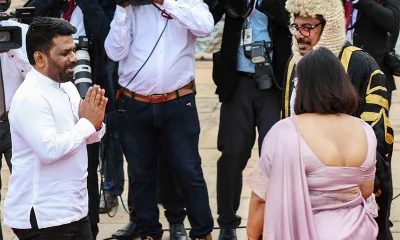
 Features6 days ago
Features6 days agoThe Degree Circus
-
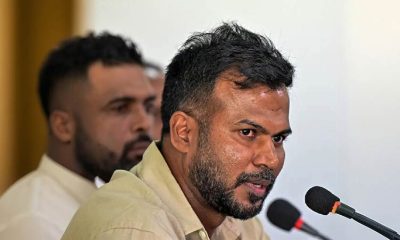
 Sports4 days ago
Sports4 days agoSri Lanka to mend fences with veterans
-

 Sports2 days ago
Sports2 days agoPathirana set to sling his way into Kiwi hearts
-

 Opinion6 days ago
Opinion6 days agoHas ‘Compass’ lost direction?
-
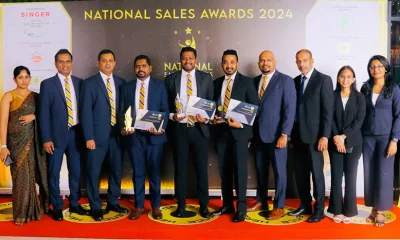
 Business6 days ago
Business6 days agoHNB General Insurance secures top honors at SLIM National Sales Awards 2024
-

 Editorial6 days ago
Editorial6 days agoCredential inflation and semantic drift
-
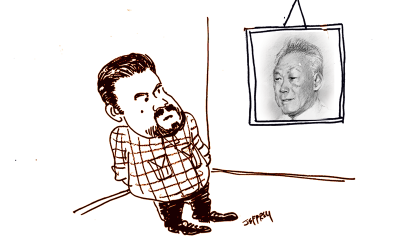
 Opinion4 days ago
Opinion4 days agoIs AKD following LKY?
-

 Editorial5 days ago
Editorial5 days agoHobson’s choice and U-turns











